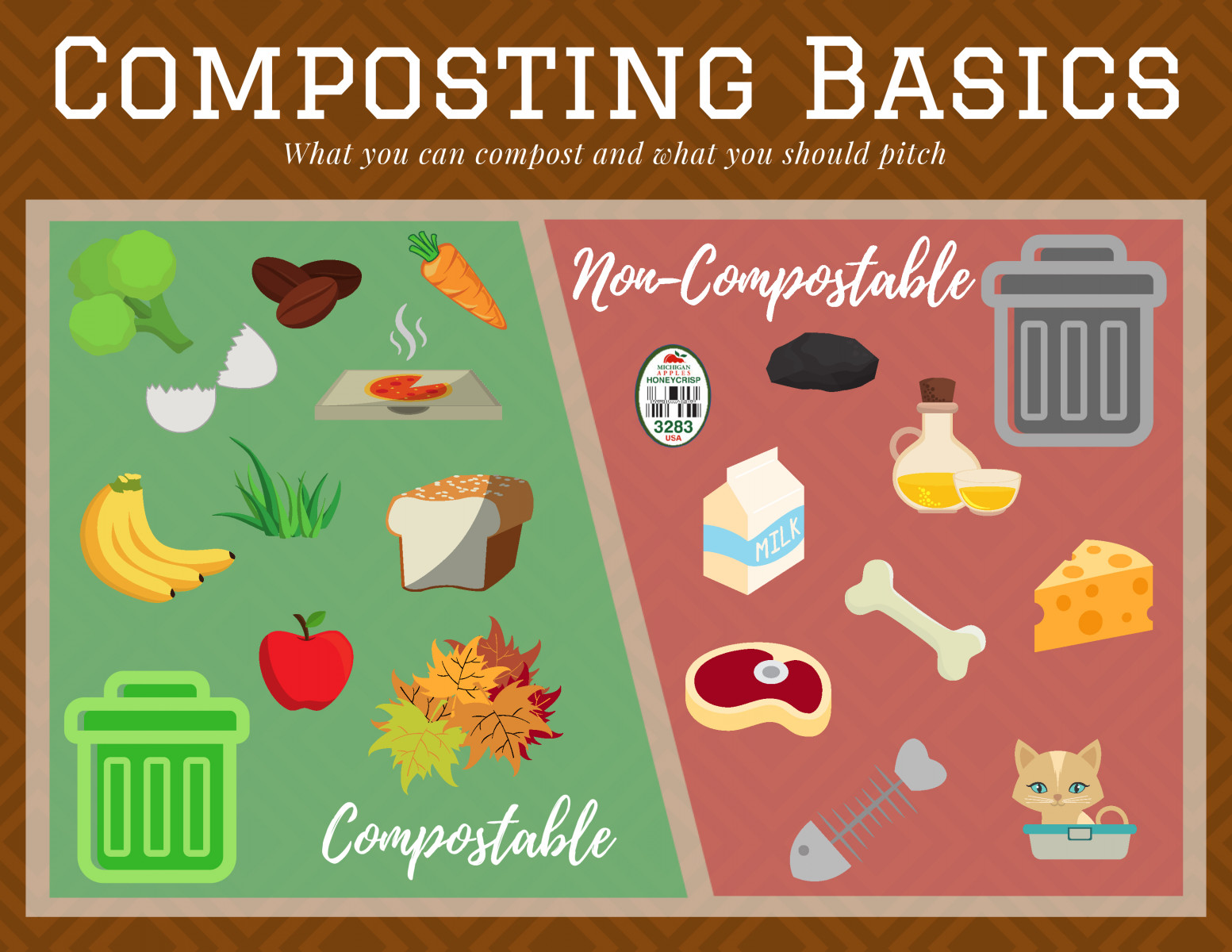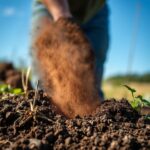Is There Anything You Should Not Compost? Essential Guide to Composting Safely

Composting is an environmentally friendly way to recycle organic waste, turning it into nutrient-rich soil for gardens and plants. While it’s a beneficial practice, not all materials are suitable for composting. Certain items can attract pests, produce unpleasant odors, or even introduce harmful pathogens into your compost pile. This essential guide will explore what you should and shouldn’t compost, helping you to understand the dos and don’ts of safe composting. By following these guidelines, you can create a successful composting system that enriches your garden while minimizing potential risks. Let’s delve into the items to avoid in your compost bin.
What Should You Avoid Composting?
When it comes to composting, it’s essential to know that not everything is suitable for your compost pile. Certain materials can introduce pathogens, pests, or toxins into your compost, compromising its quality and safety. For instance, materials like dairy products, meat, and oils can attract unwanted animals and create unpleasant odors. Additionally, certain plant materials treated with chemicals or pesticides can contaminate your compost. Therefore, steering clear of these items ensures that your compost remains healthy and beneficial for your garden.
Meat and Dairy Products
Meat and dairy products should be avoided in composting because they are prone to decomposition issues that can lead to foul odors and attract pests such as rodents and flies. These products break down slowly and can create a healthy environment for pathogens, making your compost unsafe. Instead of composting these items, consider disposing of them in the trash or exploring alternative options like municipal food waste collection.
Oils and Fats
Including oils and fats in your compost can lead to problems because they create a barrier around other organic materials, slowing down the composting process. The presence of fats can create an ideal environment for bad bacteria and thereby increase the risk of odors and pests. For a successful compost pile, it is best to keep oils and fats out and stick to plant-based materials.
Diseased Plants
Composting diseased plants poses a significant risk as it may spread pathogens throughout your compost and subsequently to your garden. High temperatures needed for effective composting may not always be achieved, which means the diseases could survive the process. To protect your garden from these diseases, it is wiser to dispose of infected plants through your municipal yard waste program.
Chemically Treated Wood and Products
Chemically treated woods and materials like pressure-treated lumber or certain types of cardboard can introduce harmful chemicals into your compost, affecting its quality and the health of your plants. These chemicals, such as heavy metals and other toxins, can leach into the soil and ultimately reach your food crops. Always verify whether wood is untreated and safe for composting before adding it.
Weeds with Mature Seeds
Adding mature weed seeds to your compost can lead to a wild growth of weeds in your garden when the compost is applied. While the heat generated in a well-maintained compost pile can kill many seeds, it does not guarantee the elimination of all seeds, especially if the pile does not reach sufficient temperatures. To avoid potential weed outbreaks, it's best to dispose of mature weeds in the trash or through designated yard waste services.
| Material | Reason to Avoid |
|---|---|
| Meat | Attracts pests and creates odors |
| Dairy Products | Compromises compost quality and draws animals |
| Oils | Slow down decomposition and attract bacteria |
| Chemically Treated Wood | Introduces toxins and heavy metals |
| Mature Weeds | Can germinate and infest your garden |
What is something that cannot be composted?

When it comes to composting, there are various materials that should not be included in the compost pile due to their potential negative effects on the process and the final product. One notable item that cannot be composted is meat. Including animal products such as meat, fish, or dairy can lead to several issues, including attracting pests, creating foul odors, and introducing pathogens or diseases into the compost. This can compromise the quality of the compost and potentially harm your plants when applied.
Types of Meat and Animal Products
Meat and other animal products, such as fish, poultry, and dairy, should be avoided in composting. These materials can decompose improperly and create an environment that favors harmful bacteria rather than beneficial microorganisms.
- Beef - Can attract scavengers and pests.
- Pork - Associated with higher risks of disease transmission.
- Eggs - While technically compostable, they can cause odors and attract pests when whole.
Processed Foods
Including processed foods in your compost can pose similar issues. Many processed foods contain preservatives, additives, and high amounts of sodium, which are not beneficial for composting. These substances may hinder the natural breakdown process and complicate nutrient availability in the compost.
- Canned goods - Often contain preservatives that do not decompose.
- Sugary snacks - Can attract pests and lead to fermentation issues.
- Fast food - Often includes packaging materials that are not biodegradable.
Oils and Fats
Adding oils and fats such as cooking oils or butter can create a greasy mess that disrupts the airflow in the compost pile. These substances can create an anaerobic environment, leading to unpleasant odors and slowing down the decomposition process.
- Vegetable oils - Can coat other materials and hinder microbial activity.
- Animal fats - Difficult to break down and attract pests.
- Processed oils - Often mixed with additives that are not suitable for compost.
Weeds and Diseased Plants
Certain plants, particularly weeds and plants afflicted by diseases, should not be composted, as they can survive the composting process and propagate again when the compost is applied to gardens. This can lead to the spread of unwanted weeds and diseases in your garden.
See also:
- Invasive weeds - May withstand composting temperatures and continue to spread.
- Diseased plants - Can harbor pathogens that contaminate healthy plants.
- Perennial weeds - Often have root structures that survive composting.
Plastics and Non-Biodegradable Items
Plastics and other non-biodegradable items pose a significant threat to the composting process as they do not break down and can contaminate the compost. These materials can lead to environmental issues and will remain in the soil for long periods.
- Plastic bags - Do not decompose and contribute to landfill waste.
- Styrofoam - Highly resistant to breakdown and harmful to the environment.
- Metal and glass containers - While recyclable, they do not belong in compost.
What things should I not compost?
:max_bytes(150000):strip_icc()/thingstonevercompost-e693cac2fe544c6b8a50489412d18205.png)
Composting is a great way to recycle organic waste, but not everything is suitable for composting. Here are some items that you should avoid adding to your compost pile:
Meat and Fish
Including meat and fish in your compost can attract pests such as rats and raccoons. These proteins can also produce unpleasant odors as they decompose. Additionally, they may harbor pathogens that can contaminate the compost.
- High likelihood of attracting unwanted animals.
- Strong odors that can arise during decomposition.
- Potential health risks due to pathogens.
Dairy Products
Dairy products, such as cheese, milk, and yogurt, should also be excluded from compost. Like meat and fish, dairy can attract pests and create foul smells during the breakdown process. Moreover, the fats and oils in dairy can lead to issues in your compost's balance.
- Unpleasant odors during decomposition.
- Can lead to pest problems.
- Imbalance of compost nutrients due to high fat content.
Oils and Fats
Adding oils and fats to your compost is not advisable, as they do not break down well and can create anaerobic conditions that inhibit proper composting processes. This can, in turn, lead to unpleasant odors and attract pests.
- Creates an anaerobic environment.
- Results in unpleasant smells.
- Complicates the composting process.
Non-Biodegradable Materials
Materials such as plastic, metals, glass, and other non-biodegradable items must be kept out of your compost. These materials do not break down and can contaminate the compost, making it unusable for gardening or landscaping.
- Do not decompose and remain in the compost.
- Can contaminate the compost and harm plants.
- Compromises the sustainability of composting efforts.
Diseased Plants and Weeds
Composting diseased plants or aggressive weeds can spread pathogens and seeds through your compost, potentially leading to problems in your garden later. Diseases may survive the composting process, contaminating healthy plants.
- Potential to spread diseases to healthy plants.
- Weeds can propagate from seeds in your compost.
- Risk of creating ongoing garden issues.
What should be avoided in compost?

Composting is an effective way to recycle organic matter and enrich soil. However, not all materials are suitable for composting. When creating a compost pile, it is essential to avoid certain items that can cause problems during the decomposition process or create unsafe conditions. Here are some materials to avoid in compost:
Meat and Dairy Products
Meat and dairy products should always be avoided in compost because they can attract pests such as rats, raccoons, and flies. Additionally, these items can create foul odors as they decay and can contaminate the compost with harmful bacteria. Instead of composting, consider disposing of these materials through municipal organic waste services if available.
- Attracts pests
- Causes unpleasant odors
- May harbor pathogens
Oils and Fats
Oils and fats, such as cooking oil or greasy foods, are not suitable for composting. They do not break down well and can create a harmful barrier that hinders the decomposition process. Furthermore, oils can lead to anaerobic conditions within the compost pile, which produce methane, a potent greenhouse gas. It's best to dispose of oils correctly through recycling programs or waste disposal.
- Impairs decomposition
- Potentially increases pollution
- Creates anaerobic conditions
Diseased Plants
Including diseased plants in your compost can introduce pathogens into the compost pile that survive the decomposition process. This can be detrimental when the compost is used in gardens, as it may spread diseases to healthy plants. It's recommended to dispose of sick plants in the trash rather than composting them.
See also:
- Can infect healthy plants
- Pathogens may survive composting
- Reduces the quality of the compost
Weeds with Seeds
Adding weeds that contain seeds to your compost can result in a weed-infested garden. While composting can effectively break down many materials, some seeds are robust and may survive the hot conditions necessary for decomposition. To prevent this issue, either remove weeds from your garden or destroy them before composting.
- Seeds may survive composting
- Leads to future weed problems
- Compromises garden health
Chemically Treated Materials
Materials treated with chemicals, such as treated wood, synthetic fertilizers, and non-organic pesticides, should not be put into compost. These substances can leach into the compost and could be harmful to plants and soil health. Always choose organic or untreated wood and avoid composting materials that might introduce toxins into your garden.
- Presents health risks
- Can contaminate soil and plants
- Negates organic approaches
Which of the following should not be composted?

Composting is an excellent way to recycle organic waste, but not all materials are suitable for this process. Certain items should be avoided in compost bins due to their potential to harm the environment, attract pests, or slow down the composting process.
Common Household Items to Avoid
Many everyday household items may seem compostable but can actually cause issues. It's important to be aware of these materials to maintain a healthy compost environment. Common household items to avoid include:
- Meat and Fish - These can attract pests and produce foul odors.
- Dairy Products - Like meat, dairy can lead to unpleasant smells and unwanted pests.
- Oils and Fats - These can create a greasy mess and hinder the composting process.
Diseased Plants and Weeds
Adding diseased plants or invasive weed species to your compost can spread diseases in your garden. Following are reasons to exclude these items:
- Pathogens - They may survive the composting process and infect healthy plants.
- Seeds - Certain weeds can regrow if their seeds are not adequately broken down.
- Root Systems - The root systems of invasive plants can proliferate if added to compost.
Non-Biodegradable Materials
Certain items simply do not break down, causing pollution and waste issues. Non-biodegradable materials to avoid include:
- Plastic - This does not decompose and can contaminate your compost.
- Glass - Like plastic, glass remains unchanged, posing safety risks.
- Metal - Metals can rust but will not break down, leading to landfill waste.
Chemically Treated Wood and Pressed Products
Chemically treated wood can leach harmful substances into your compost, which can be detrimental to plant health. Consider these points:
- Pressure-Treated Wood - Contains chemicals like arsenic that are harmful to the soil.
- Composite Decking - This often includes plastics and chemicals unsuitable for composting.
- Painted Wood - Paints may contain toxic substances that should not enter the compost cycle.
Unfinished or Processed Items
Some materials can disrupt the composting process if they are not fully decomposed or are excessively processed. Here are important examples:
- Unfinished Compost - Adding unfinished compost can introduce pathogens and disrupt the microbial balance.
- Processed Foods - High sugar or salt content in processed foods can harm compost piles.
- Incinerator Ash - This can contain heavy metals and toxins that are harmful.
Questions from Our Readers
Is it safe to compost meat and dairy products?
Composting meat and dairy is generally not recommended because they can attract pests and produce unpleasant odors. While some advanced composting systems can handle these materials, it’s best to avoid them in a typical home compost bin to maintain a healthy composting environment.
Can I compost pet waste?
Composting pet waste, particularly from dogs and cats, is typically not advisable. These animal wastes can contain pathogens and parasites that could survive the composting process, making it unsafe for use in gardens and on plants intended for human consumption.
Should I include processed foods in my compost?
It is generally best to avoid composting processed foods, as they often contain additives and preservatives that do not break down easily and may harm beneficial microbes in the compost. Stick to natural, organic materials for the best results in your compost pile.
Are there any types of paper that should not be composted?
Yes, certain types of paper should be excluded from compost. Paper that is coated, glossy, or contains ink from harmful dyes can introduce toxins into your compost, while plain newspaper and cardboard are excellent for composting instead. Always aim for uncoated, non-toxic paper products.
See also:

If you want to read more articles like Is There Anything You Should Not Compost? Essential Guide to Composting Safely, we recommend you check out our Compost category.
Leave a Reply
Related Articles